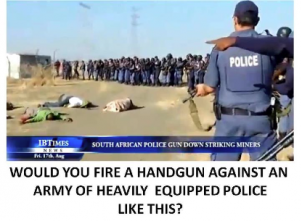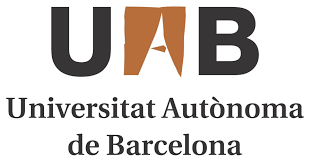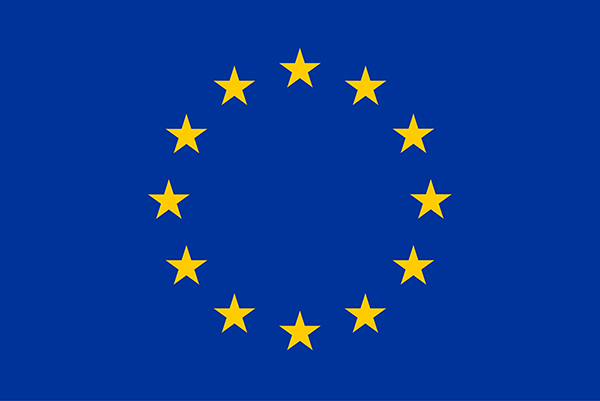
EJOLT collaborator Professor Patrick Bond explains the background to the shootings in Marikana where 34 mine workers were shot dead by the police on August 16 and another 270 were arrested and charged of murder. He places what happened in a staggering context of a country liberated from official apartheid racism but then soon derailed by neoliberalism and crony capitalism. This blog is a collection of excerpts from his 18-page illustrated article.
This incident not only represents human rights and labor-relations travesties, it offers the potential for a deep political rethink of the liberation movement in South Africa, the African National Congress (ANC). First the facts on the Marikana massacre:
South African police ordered thousands of striking platinum mineworkers off a hill more than a kilometer away from Lonmin property. As they left the hill, which the police surrounded with barbed wire, 34 were killed and 78 injured. No police were hurt in the operation. Most were killed while trying to escape. 270 were arrested and state prosecutors charged them with the ‘murder’ of their colleagues (under an obscure apartheid-era doctrine of collective responsibility).
This was followed by an embarrassed climb down by the national prosecutor, under pressure most of South African society. President Zuma ordered a judicial commission going beyond the who-shot-who question, in a move to divert anger against him to the company involved. But it took time for society to react, as media bias first allowed the impression to emerge that police were ‘under attack’ by irrational, drugged and potentially murderous men from rural areas.
As you can read in the longer article, Lonmin has a long history of bribery, bullying and buying off trade-union leaders. Its operations are typical of the platinum belt, which contributes to the toxicity and overall pollution that means South Africa’s ‘Environmental Performance Index’ has slipped to 5th worst of 133 countries as measured by Yale and Columbia academics this year. Some two-dozen anti-corruption whistleblowers have been killed in recent years, in at least one case arranged by a corrupted mayor.
When Zuma’s predecessor Thabo Mbeki took over from Mandela in 1999, Mbeki said, “we must strive to create and strengthen a black capitalist class”. One man who lubricated the process of corrupting the ANC even before that was Tiny Rowland, formerly a member of Hitler Youth in Hamburg and the man that long ruled Lonmin. But while he, the World Bank, ANC cadre and ‘sweetheart’ trade unions are all embarking on a ‘talk left’ in order to ‘walk right’ path, workers are showing signs of resisting.
Even after the massacre, the Marikana workers refused to return to their rock drilling jobs until they received a wage increase of 22 percent – which they won after a month’s strike. Inspired, one in five other South African mineworkers quickly embarked upon wildcat strikes, leading in many cases to their own substantial above-inflation pay hikes. Similar militancy was soon evident in trucking, the auto sector, municipal labour and other sectors. What, then, does rising worker confidence mean politically, for the future of the ANC and the crony capitalism it promotes?
Based on historic precedent in South Africa, we have to ask: is the disparate resistance signified by Marikana similar to the early 1960s and hence will there be much more repression before a coherent opposition emerges? Or will the contagion of protest from this and thousands of other micro-protests across the country start to coagulate, as in the 1976-94 period, into a network similar to the United Democratic Front to challenge ANC electoral dominance? Or, might something happen quite suddenly to rearrange power relations, as in 1992, and as we saw in Egypt in the wake of independent labour organizing against state-corporate-trade union arrangements in the years prior to the massive Tahrir Square mobilizations in early 2011?
Currently, the so-called populist Julius Malema, the ANC’s former youth leader, is channeling political support from mineworkers fed up with Zuma. Even while contesting fraud charges in his home base, Malema has been an unstoppable force across the mining belt. But the forces for genuine change have to be gathered from below, for Malema’s agenda is still apparently a reentry to the ANC.
One sign of hope is the emergence of a women’s mutual-aid movement based both amongst mineworker wives and girlfriends, as well as the broader communities near Lonmin, and potentially stretching to other sites of struggle hundreds of kilometers away. Another option for resistance comes from new versions of a debt moratorium or organized debtor’s cartel – such as the ‘bond boycott’ strategies that were so common in the early 1990s, in reaction to the microfinance short-term loans offered to mineworkers that carry exceptionally high interest rates. A third move away from the exploitative economics would be a renewed demand for nationalisation of strategic resources – though with the current parasitical political ruling elite still in place, this is neither possible nor desirable.
How far will the diverse momentums of Marikana pull South African society? Which political narratives are emerging, and can they become the basis for a social understanding that will mobilise the tens of millions of disgruntled South Africans into a force capable of breaking sweetheart relations between state, ruling party, labour aristocrats, parasitical capital and the London/Melbourne mining houses? The answer, so far, is not encouraging.
What is definitive, though, is the waning of any remaining illusions that the forces of ‘liberation’ led by the ANC will take South Africa to genuine freedom and a new society. Marikana will have that effect, permanently, I suspect, so long as protesters keep dodging police bullets and moving the socio-economic and political-ecological questions to centre stage, from where ANC neoliberal nationalism could either arrange a properly fascist backlash, or more likely under Zuma’s ongoing misrule, continue shrinking in confusion and regular doses of necessary humility.
More info:
http://www.bbc.co.uk/news/world-africa-20226292





This post is truly a good one it helps new the web users, who are wishing in favor of blogging.